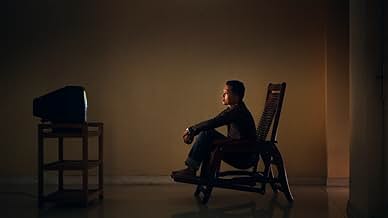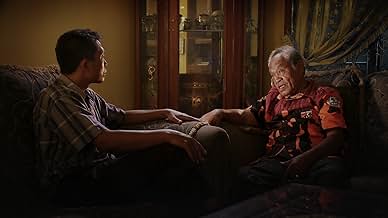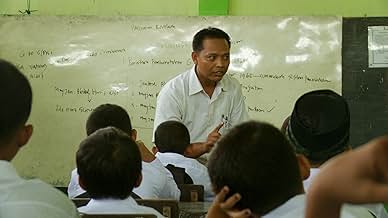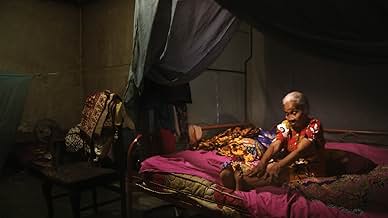The Look of Silence
- 2014
- Tous publics
- 1h 43min
Une famille qui a survécu au génocide en Indonésie affronte les hommes.Une famille qui a survécu au génocide en Indonésie affronte les hommes.Une famille qui a survécu au génocide en Indonésie affronte les hommes.
- Nommé pour 1 Oscar
- 48 victoires et 45 nominations au total
- Self - former leader of death squad
- (images d'archives)
- Self
- (voix)
- (as Josh)
- Self - Sprecher
- (voix)
- (as Achim Schülke)
- Self - reporter, NBC News
- (images d'archives)
Avis à la une
This is definitely a companion piece to the previous "Act of Killing". Not because it does not stand on its own, which it does, but because they stand so much stronger together. Each documentary has an unique perspective on some mutual themes. Especially guilt and remorse.
It's amazing how it all comes together in a movie like this. Oppenheimer must have done a lot of work for this. Adi is such a good subject for a documentary like this, and having him being willing to explore this dark side of his nation's history, and openly talk to the people who brutally murdered his brother - it's such an unique way to explore all of this. And Adi does a really good job with it all.
What I got out of this documentary was that many of the killers didn't know what a communist was, let alone think they were people. They were spun lies about the communists and many took joy in killing them. One of the most eye opening documentaries I've seen, amongst one of the most sadistic and terrible mass killings in history.
His second film, "The Look of Silence", coupled with his "The Act of Killing" has created a sea- change in the Indonesian truth, justice and reconciliation movement. Forcing new laws to be written and putting the government in a defensive position against the nation's media.
But Oppenheimer is more than an activist. He's an artist. His films are contemplative, playful and quietly confrontational. His visual attack is succinct, his marriage of form and theme is flawless and his moral intent is thunderous.
Where "Act of Killing" was concerned with a larger study of post-massacre Indonesia, "Look of Silence" chooses a more intimate landscape. Geographically, emotionally and cinematically it is regional. Concerned with a single killing, the men who did it – directly and indirectly - the family it affected and the small village that has lived with questions about other killings like it for fifty years. Where "Act of Killing" lived in absurdist grand cinema, "Look of Silence" exists in tight close-ups of the perpetrators, survivors and truth-seekers. More than anything, more than words, their faces tell the story. So much happens behind the eyes, around the corners of the mouth, in unspoken glances. The horror, doubt, guilt and seemingly impossible reconciliation stirs below the surface. For all the cinematic flex of "Act of Killing", this contained take on the same material, seems more haunted and human.
The star of the film, Adi the eyewear peddler, pursues this mission with intelligence and courage. We meet his family. His happy playful daughter, his thoughtful son, his cautious loving wife, his ageless mother (probably the most engaging character captured on film this year), his wisp of an ancient father, and his memory of a murdered brother, looming over everything. From them he finds the courage to question murderer after murderer face-to-face. The combination of his profession as an optometrist with his quest to seek truth would seem heavy-handed if it were fiction, but nothing here is inauthentic. In showing all of Adi's family, from the fresh and young, to the spent and dying, we see the full arc of life.
Lastly, the film makes a glancing but firm indictment against the American anti-Communist fervor that fed into - and the American corporations that profited from - these killings. It gives strong evidence that the Cold War, the war of ideology and the murder of millions, allowed for, and was even fought for, Western corporate dominance in places like this. And here the grinding up of human beings for profit in this situation is undeniable. Oppenheimer wants to make sure no one involved gets off without having to face, if not their own role in the massacre of millions, then at the very least, their culture's.
And so it goes, the people (wives, mothers, daughters, sons, fathers, husbands), the silence, the haunted jungle hum that fills most of the auditory space in the film, the great and overwhelming significance of it all everything pools together to show us something words alone can't manage. Something about how a horror can be so great that its impact can loom over generations. About living with debilitating fear of those who have claimed power over you through violence. About the most nightmarish tendencies in humanity, and our courageous capacity to overcome the worst of ourselves. About just how difficult it is to look into the eyes of a killer and say, "I know what you did."
And more profoundly, more frighteningly "I know you."
The two films work well together, Act of Killing being more overview and focusing on the killers and the political structure/mob rule that is still in power. Act of Killing doesn't particularly explore how they got away with genocide (why the world turned a blind eye), but this is alluded to carefully and specifically in Look of Silence.
I could write so much because the two films together have provoked in me a profound perspective on human horror, which has gripped me most recently with what we see on the news with ISIS (Paris Masacre).
What are human beings capable of, and why is an individual able to make such choices? What are the structures that facilitate the most grotesque of human acts of wickedness upon one another. Do we all contain wickedness, does a killer lurk inside us all? Does fear itself propel the killers - kill or be killed? Are we (cells in the human organism) enacting our worst imaginable terror, excising evil, I kill therefore I am?
Josh Oppenheimer, I applaud your work. The sensitivity and attention to the finest detail employed in your work is, for me, beyond words. The cinematography, colours you choose, balance in composition. Even the subtitles were easy to read. Beautiful lingering pauses. You said of one still scene, a bridge, pale green, a river bank; you have no words to describe how this scene makes you feel, what the scene says. For me this scene (in LoS) is terrifyingly beautiful, sad, the weight of recent history hanging there in the stillness. Embodying the sadness and fear. I love that still scene.
Superb, I do not have the words to describe what your films say to me... I will think about them for a long long time, and watch them again.
Le saviez-vous
- AnecdotesAdi and his family moved thousands of kilometers away to the other side of the country, out from under the shadow of the perpetrators who are still powerful situation in North Sumatra.
- Citations
Himself, brother of murdered Ramli Rukun: Tell me about that madness.
Himself, former leader the village death squad: Some killed so many people who have gone mad. A man climbed a palm tree, every morning, to call for prayer. Killed too many people. There is only one way to avoid it. Drink the blood or go crazy. But if you drink blood, you can do anything.
Himself, brother of murdered Ramli Rukun: [Testing the eyeglasses] What do you think...
Himself, former leader the village death squad: Salty and sweet. The human blood.
Himself, brother of murdered Ramli Rukun: Pardon?
Himself, former leader the village death squad: Human blood is salty and sweet. I know from experience.
- ConnexionsEdited into P.O.V.: The Look of Silence (2016)
- Bandes originalesLukisan Malam
music by E. Sambayon & lyrics by Sakti Alamsyah
performed by Sam Saimun
courtesy of Irama Records
Meilleurs choix
- How long is The Look of Silence?Alimenté par Alexa
Détails
- Date de sortie
- Pays d’origine
- Sites officiels
- Langue
- Aussi connu sous le nom de
- Sessizliğin Bakışı
- Lieux de tournage
- Sociétés de production
- Voir plus de crédits d'entreprise sur IMDbPro
Box-office
- Montant brut aux États-Unis et au Canada
- 109 089 $US
- Week-end de sortie aux États-Unis et au Canada
- 6 616 $US
- 19 juil. 2015
- Montant brut mondial
- 157 857 $US
- Durée1 heure 43 minutes
- Couleur



























